When it comes to creating a resilient community, it’s important to consider the education we offer our youths. Education has the potential to empower future generations with the values, understanding and connections necessary for everyday actions that nurture a healthier world.
What can we as parents and mentors do to water our sprouts so that they will grow strong? Where are we falling short, and what is necessary to empower upcoming generations to succeed? Some parents and teachers are seeing our children’s education fall short. It’s time to consider “who” we are graduating into the world, they say — and shift the focus from memorization and abstract academia to purpose and values.
Quit hovering: Let ‘em romp
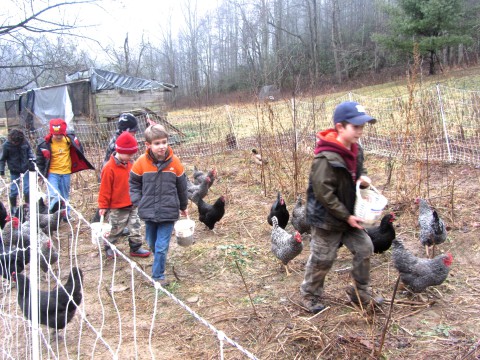
On a cold January morning, deep in the mountains east of Fairview, a mama hog watches as minivans and station wagons approach along the muddy drive of Adelbert Farm. Home-schoolers ages 5 to 15 hop out of the vehicles, trotting past hungry animals to hang their backpacks on a wooden rack under a few old oak trees. They pick up sticks, break up chunks of ice from the frozen creek and kick them around — warming up for their day of school.
This farm is a 133-acre piece of land that serves as the classroom for 15 to 20 home-schooled kids Monday through Thursday, rain or shine. The schoolhouse? Well, there really isn’t one — only two small, wood-heated buildings for when students and teachers need a dry, warm environment for book study or snack time.
“Depression rates among kids are higher than has ever been recorded,” says Joe Kirstein, who owns and operates the farm school with his wife, Kimberly Kirstein.
“[One] study suggests that it’s because the kids don’t get enough free, unsupervised play,” Joe says. “There’s something about when you just go up in the woods and have stick fights and just be kids without an adult following you around and hovering … There’s something mentally that happens that’s empowering and, apparently, essential.”
Kimberly agrees, explaining that Adelbert’s program cultivates positive and energetic attitudes by giving the kids autonomy “instead of every aspect of their lives being controlled by something external.”
Whether rendering pig fat to observe mitosis or studying evolution by observing character divergence in one batch of chicks, the kids choose their individual roles for planning and completing projects. They exercise choice in how they relate to the task, all the while gaining meaningful skills and relationships with the plants and animals around them. “They go home feeling like they actually accomplished something,” Kimberly says.
By encouraging self-determination, the Kirsteins not only strive to empower students to enjoy the successes of their decisions, but also to experience the grief that comes with poor planning or loss. For Laurel Abel, whose kids Jaden and Junah attend the farm school, allowing children to develop real-life skills for real-life situations is an indispensable aspect of education.
“It’s not about sheltering them from the world,” Abel says. “Everybody always says [of home schooling], ‘You’re too protective’ … but I see it as the opposite: This is not a shelter. It’s immersion in real-life situations, real-life knowledge, real people and how to live.”
Connection and purpose
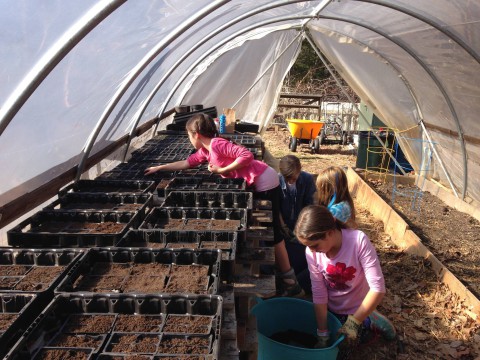
How relevant is a subject unless it relates to who we are and our purpose in this world?
“I think that the lack of connection that kids and adults have with the world around them is devastating everything we know right now,” says Abel. “[Kids] are taught not to go with their gut. They’re taught that they have no intuition. And I think that is very, very dangerous.”
Instead, Abel says, kids should be taught connection. Connection with the Earth and environment starts with spend- ing time outside, opening the senses and experiencing the emotions that this interaction elicits. Connection transforms objects into subjects and forges relationships that inspire a natural curiosity.
“I want my children to know that plants can heal them,” Abel says, “that the Earth is there for them, but that we have to take care of the Earth. I want them to know where their food came from — that an animal died for this food … not to feel guilty about it, just to realize what’s happening.”
Understanding the stories behind a concept like where our food comes from can trigger emotions — especially when spending time with animals or plants. And those emotions create a connection, which naturally leads to a sense of environ- mental responsibility, Abel adds.
Equally important in fostering this connection and emotional bond is presenting the lessons’ topics and inquiries as overlapping and interdependent. While some would argue a highly focused, specialized education may ultimately aid students when they enter the job market, many are recognizing that overly specialized, siloed educational tracks are having a negative impact on students’ overall mentality, understand- ing and appreciation of interconnectedness.
At Evergreen Community Charter School, students are encouraged to explore their lessons through “expeditionary learning,” an approach that ties all of the subject areas together around a particular query or “expedition.” Students are given “learning targets,” where, piece by piece, they can see how they investigate a topic and advance in the expedition as a whole.
“If the expedition-guide question is, ‘Where does my food come from?’ the daily learning target might be, ‘I can interact with a local farmer in an interview and derive an understand- ing of where my food comes from,’” says Sarah Shoemaker, Evergreen’s associate director of grades five through eight.
Expeditions involve fieldwork and community outreach, so that the lesson is not only grounded in the real world, but also develops an emotional connection between the students and what they are studying.
“Evergreen’s mission statement is environmental stewardship and social justice,” Shoemaker says. “Throughout what we do, we’re seeking to tie in those two things, [so] it becomes second nature for the students to [ask], ‘Is everyone being considered here? Is the environment taken care of?’”
Without purpose, Shoemaker explains, there is no direction to the quest. But perhaps even more important is what the kids actually do with the results they discover.
“If we’re learning about stream water, we could [just] make a final product that is just a poster board that informs, or we could write letters to the city … ask for professionals’ time and present our findings,” Shoemaker says. “The question of what you do when you get to the end of your expedition — do you just sit back? The answer is hopefully ‘no.’”
It’s on me
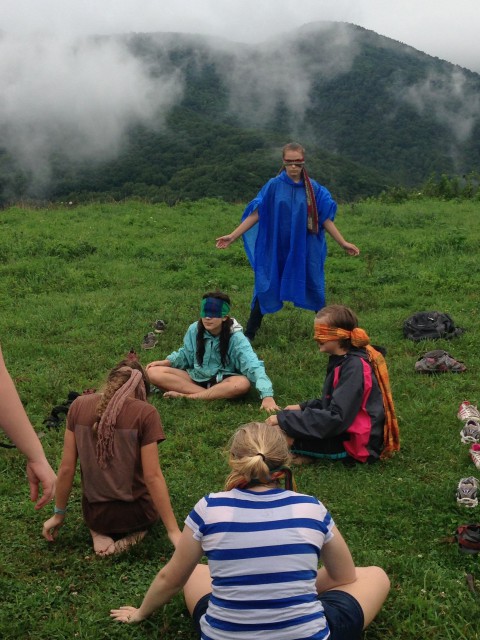
Rites of passage have long served to impart knowledge and wisdom to boys and girls, men and women, as they age. As children assume levels of autonomy, so too must they assume responsibility for their environment and community — freedom and responsibility are inextricable and interdependent.
Today, such rites are largely absent from our modern society, and some have observed a wedge being driven between freedom and responsibility, putting them at odds with each other. The fewer responsibilities we have, the more freedom. Some say this attitude renders a disoriented populace that has lost the ability to find empowerment through accountability — sparking a call for reintegrating rites of passage into contemporary culture.
High school students Aurelia Garlock, 14, and Mary Claire Fagan, 15, both expressed a lack of connection to the subjects they studied in school.
“I really hated Earth and environmental science,” Mary Claire admits. “I felt really helpless because it was all about the negative impacts of our generation and generations before us.
“There was no way my class was trying to change it,” she continues. “[It seemed like], ‘Well, you can’t vote now, so you can’t do anything.’”
Ironically, these girls are now more invested in the environment than most people, let alone kids their age. Turns out, it wasn’t environmental science they disliked — it was the disconnected way it was taught.
“When we’re actually out and feeling the Earth and being in the environment, it’s lovely,” Mary Claire says. “When you’re there, you actually see how it is hurt. You can see how you can do something about it.”
Both girls are veterans of Earth Path Education’s Growing Goddess, a rites-of-passage summer camp for young women ages 11 through 14. Founded and directed by Lena Eastes, Growing Goddess covers everything from primitive skills to self-reliance, accountability, nurturing, grieving, plant identification, sacred ritual, sensuality, sex, how to embrace womanhood and more.
For Fagan and Garlock, it’s clear their friendship runs deep. They consistently reinforce confidence in each other as they talk and interact. They compliment each other and offer support and nurture at every opportunity. They refer to each other as “goddesses” — and explain that they do the same with all their female friends.
Eastes says this kind of mutual support is essential for girls at this age. “This is definitely something that young women need in their lives to mark a transition [and] leave behind what doesn’t serve them,” Eastes reflects. “Life will initiate us, … but to miss the witnessing and the celebration around it is such a huge loss.
“Culturally, I think we’re adolescent,” she adds. “[Political leadership] is making adolescent choices. That’s why rites of passage had always been integrated.”
Vicki Garlock, Aurelia’s mother, adds that the program allows her daugher’s personal experiences to shape her further education. “Those experiences will be part of their story,” she says. “Their personal narrative about who they are and what they’re about … what they value in their friends, what they value in their community.”
It’s difficult for students to find that personal, purposeful connection solely within the walls of a classroom. But connection and purpose are vital for youths to develop a sense of responsibility for the community and the environment — and to discover how taking personal responsibility is actually empowering.
Responsibility is what Keynon Lake fosters at My Daddy Taught Me That, a mentorship program for young men in grades six through 12 based at Pisgah View Community Center.
“As human beings, we always try to find the easy way out,” Lake observes. “When things get too hard, we quit or give up. We’re starting to see a society where no one wants to take responsibility for anything. We always point the finger and say, ‘Well if it wasn’t for X, Y and Z’ … But if we really take a step back and examine ourselves, then you’ll find that the change you want to see in this world is the change you need to be.”
My Daddy Taught Me That includes weekly discussion groups, where participants talk about real-world issues — from the privatization of prisons to third-grade literacy rates to the “fictitious masculinity” marketed through gangster rap artists, Lake explains. Being a man, he says, involves awareness of what’s going on in the world and, most importantly, a willingness to take responsibility for it.
Lake fears our society is becoming timid about teaching ac- countability to today’s youths. We provide outs and excuses, we break their falls and say, “It wasn’t your fault.” He explains that if we miss the opportunity to teach accountability — to teach youths to own the repercussions of their actions — we rob them of their initiation into adulthood.
Lake cites the example of giving all the kids a trophy just for trying. It’s a nice gesture, he explains, but it doesn’t teach them anything. “It doesn’t inspire you to work harder,” he says. And while it may save them from the disappointment of failure and loss, it equally robs them of the elation of discovering for themselves what they’re capable of.
Service and mentorship
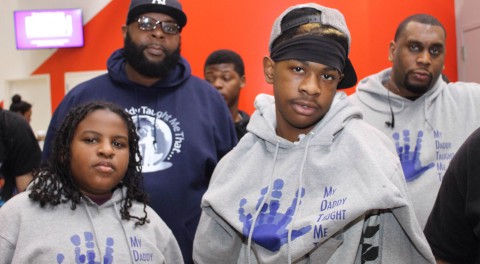
Integral to My Daddy Taught Me That is mentorship — connecting the young men to professionals in the community who share their backgrounds to help facilitate what Lake terms “life-changing events.” Intended to inspire, these events have included professional sports games, helicopter rides, camping and visits to museums and memorials.
In early March 2015, Lake launched a 12-week partnership with Echo Mountain Recording Studio, offering students a residency to learn basic music production, equipment operation and songwriting. The program even brought in music professionals, including producers who worked with artists India Arie and Michael Jackson.
Connecting with a mentor offers an opportunity for students to see success, understand that it’s not just an abstract idea and visualize a path for themselves. Reciprocally, empowering students to take the position of instructor further strengthens that knowledge and emboldens their skills with a purpose to serve. Lake’s older boys are set up to mentor the younger ones through heart-to-hearts to talk about mistakes they’ve made and challenges they faced, offering insights on overcoming problems on their own.
“We teach that the true essence of [manhood] is to love our neighbors and to lift them up,” Lake says. “If you’re successful, … you reach back and you pull up.”
Similarly, the other curricula complete the circle with vari- ous mentorship models. Back at the fields of Adelbert Farm, Jaden looks out for and helps teach her little brother Junah as they learn together. At Evergreen, sixth graders adopt “kinder-buddies” that they read to and create craft projects with. And in the summer of 2015, Aurelia and Mary Claire will step up as Earth Path’s first “Moon Mystics,” reaching back to help new goddesses rise up on their journey toward womanhood.
The technical skills and knowledge future generations will need to live powerfully and solve the world’s problems are as many as the leaves on a tree — but those colorful leaves will need strong branches to cling to. The life skills they learn as children will stay with them into adulthood — in their bones, consciences and convictions.


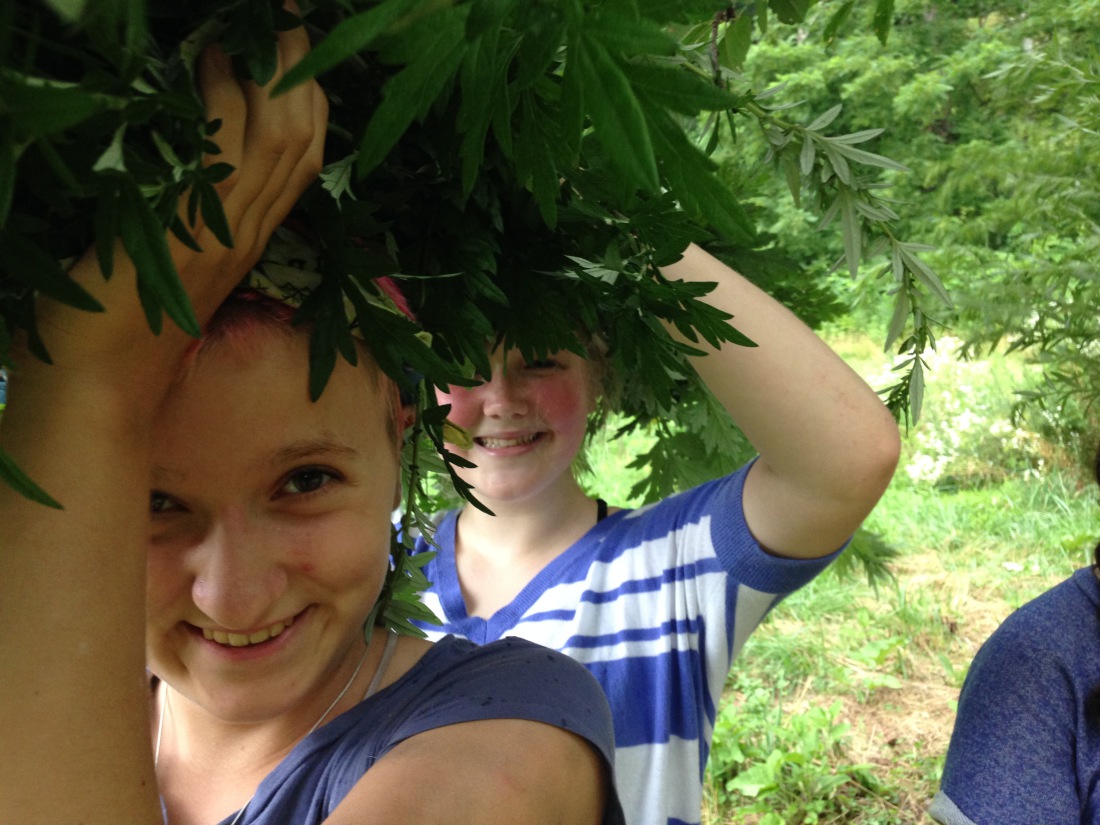
Before you comment
The comments section is here to provide a platform for civil dialogue on the issues we face together as a local community. Xpress is committed to offering this platform for all voices, but when the tone of the discussion gets nasty or strays off topic, we believe many people choose not to participate. Xpress editors are determined to moderate comments to ensure a constructive interchange is maintained. All comments judged not to be in keeping with the spirit of civil discourse will be removed and repeat violators will be banned. See here for our terms of service. Thank you for being part of this effort to promote respectful discussion.